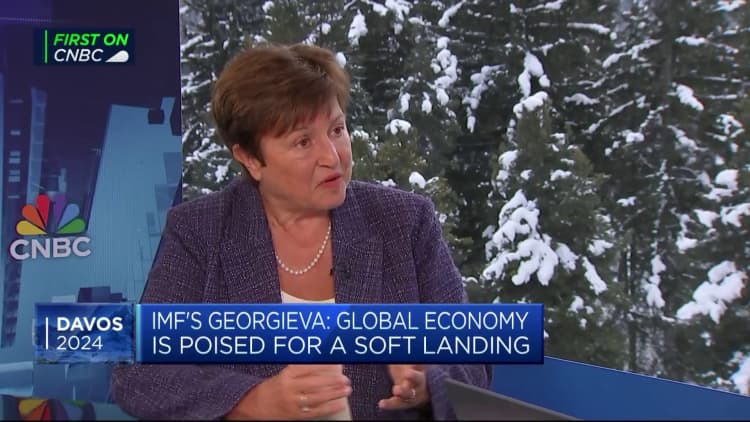Buildings in the Lujiazui financial district in Pudong in Shanghai, China, on Monday, January 29, 2024.
Bloomberg | Bloomberg | Getty Images
The International Monetary Fund on Tuesday raised its global growth forecast, citing unexpected strength in the U.S. economy and fiscal support measures in China.
It now expects global growth to be 3.1% in 2024, up 0.2 percentage points from the previous forecast in October, followed by growth of 3.2% in 2025.
Large emerging countries such as Brazil, India and Russia have also developed better than previously expected.
The IMF believes the likelihood of a so-called hard landing, an economic downturn after a period of strong growth, is now lower, despite new risks from rising commodity prices and supply chain problems caused by geopolitical volatility in the Middle East.
It forecasts growth this year of 2.1% in the US, 0.9% in both the euro zone and Japan and 0.6% in the UK.
“What we saw is a very resilient global economy in the second half of last year, and that will continue into 2024,” IMF chief economist Pierre-Olivier Gourinchas told CNBC’s Karen Tso on Tuesday.
“This is a combination of strong demand in some of these countries, private consumption and government spending. But also, and this is very important in the current context, there is also an offer component. … So very strong labor markets, supply chain tensions that have eased, and the decline in energy and raw material prices.”
The latest official figures showed that the US economy exceeded economists’ expectations with growth of 3.3% in the fourth quarter.
China has faced a host of problems over the past year, including a disappointing recovery in spending after the pandemic, concerns about deflation and an ongoing crisis in the real estate sector. In response, the government implemented numerous economic stimulus measures, thereby contributing to the IMF’s appreciation.
However, the IMF forecasts remain below the global growth average between 2000 and 2019 of 3.8%. Higher interest rates, the withdrawal of some fiscal support programs and weak productivity growth continue to weigh, the institution said.

However, tight monetary policy has caused inflation to fall faster than expected in most regions, which Gourinchas described as “other good news” in Tuesday’s report. The IMF expects global inflation to reach 5.8% in 2024 and 4.4% in 2025. In advanced economies, this will fall to 2.6% this year and 2% next year.
“The battle against inflation has been won and we have a higher probability of a soft landing. This sets the stage for central banks, the Federal Reserve, the European Central Bank, the Bank of England and others to begin easing their monetary policy.” “We will cut interest rates as soon as we know for sure that we are on that path are,” said Gourinchas.
“Right now we are forecasting that central banks will wait to get a little more data. They meet on a session-by-session basis, are data dependent and confirm that we are on this path. That’s the baseline. And then if we are, then we will see interest rate cuts in the second half of the year,” he said.
While central banks are unlikely to ease monetary policy too soon, there is also a risk that policy will remain too restrictive for too long, which would slow growth and push inflation below 2% in advanced economies, Gourinchas added.
Source link
2024-01-30 17:01:00
www.cnbc.com









